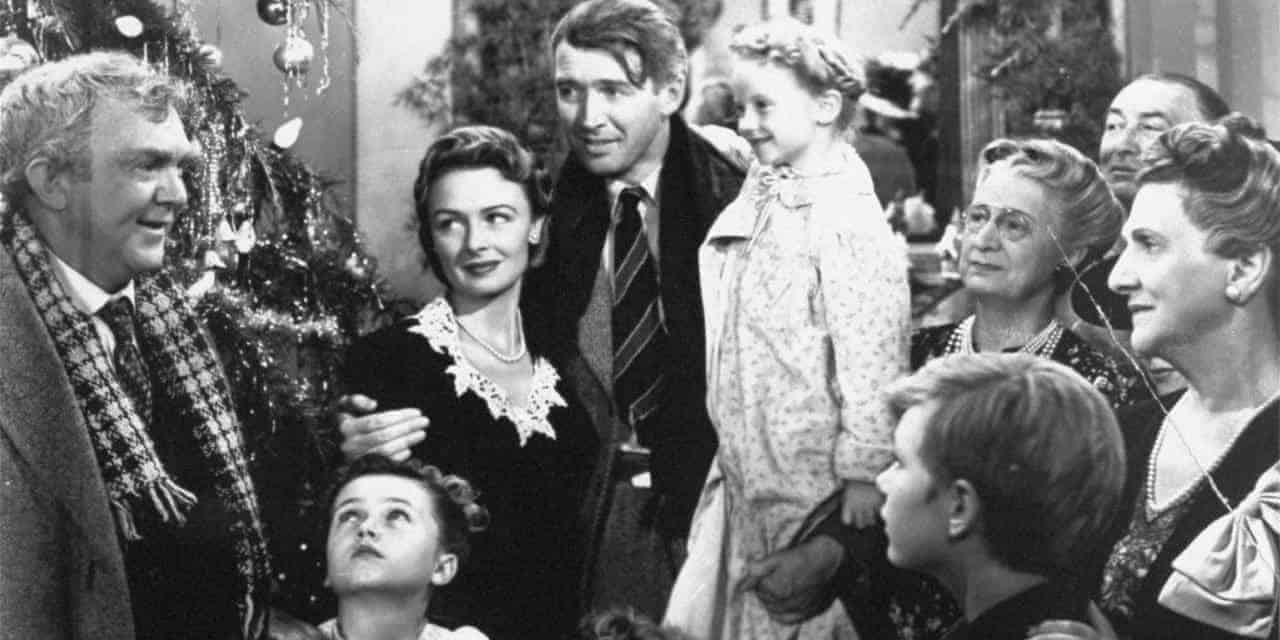Although it has been over 70 years since its release, It’s a Wonderful Life is still a Christmas classic and a staple of holiday programming. It is also one of the most critically acclaimed movies in history and was nominated for five Academy Awards, including Best Picture. Even so, the 1946 film was not a commercial success and actually lost over $500,000 at the box office. Reviews at the time were mixed with Bosley Crowther of The New York Times railing against the movie’s sentimentality.
In It’s a Wonderful Life, James Stewart stars as George Bailey, a banker who is on the verge of suicide on Christmas Eve, 1945. However, his guardian angel shows George that he has lived a worthy life and illustrates how different his community, Bedford Falls, would have been had George never been born. He eventually concludes that life is worth living and at the end, the guardian angel gets his wings while George is helped by the townsfolk. It is the classic ‘feel good’ movie but according to certain members of the FBI, It’s a Wonderful Life was nothing more than communist propaganda.

The Scrooge-like Character of Henry F. Potter
It’s a Wonderful Life appeared on a secret list of movies maintained by the FBI for up to a decade after its release. The purpose of the list was to weed out Communist propaganda and for FBI informants, this Christmas classic was guilty of discrediting bankers, a common Communist tactic. In 1947, an FBI memo said that the poor depiction of banker Henry F. Potter was an attempt to discredit the profession. It continued by saying that the depiction was a deliberate ploy to ensure that Potter was the most hated character in the movie.
In It’s a Wonderful Life, Potter (played by Lionel Barrymore) is Bedford Falls’ richest man and also the meanest. He is a powerful shareholder in the business, Bailey Brothers’ Building and Loan, but to his chagrin, he doesn’t own the bank as he does with most of the town’s businesses. Potter is also a greedy slumlord but becomes irritated when Bailey, who takes over Bailey Brothers, launches Bailey Park, an alternative to the overpriced slums offered by Potter. The miser is amazed at Bailey’s actions which he dismisses as ‘sentimental hogwash’. He also asks Bailey: “Are you afraid of success?”

Potter tries, and fails, to buy Bailey off with the offer of becoming his assistant along with an enormous annual salary of $20,000. However, Potter gains the upper hand because Bailey’s daft Uncle Billy misplaces $8,000 of the bank’s cash and it becomes clear that the bank could be subject to criminal charges. Bailey asks Potter for a loan but the miser phones the police instead to have his nemesis arrested. After contemplating suicide, Bailey returns to the town and finds that the people of Bedford Falls have raised the $8,000. As a result, Potter’s warrant is torn up and Bailey Brothers is saved. To the untrained eye, the plot is nothing more than a movie that illustrates the benefits of being kind but to the FBI, it was something far more sinister.

